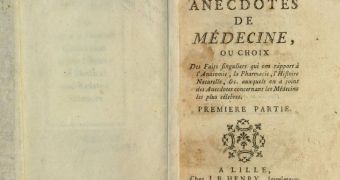A recent paper in the journal Resuscitation (yes, one such journal actually exists and it's as sciency as it gets) details the discovery of what is believed to be the oldest known medical description of a near-death experience.
Information shared with the public says that this medical report dates back to decades ago. Thus, it was written by a French physician identified as Pierre-Jean du Monchaux sometime around the year 1740, Live Science details.
What's interesting is that this medical report on a near-death experience dates back to a time when religion played a very importance role in people's lives, meaning that folks turned to it whenever faced with things they had trouble understanding.
As explained in the paper in the journal Resuscitation, the medical description in question tells the tale of an apothecary in Paris who, at one point, lost consciousness and remained out of touch with reality for quite a while.
Shortly after recovering, the man recalled that, while unconscious, he came face to face with a bright light that reminded him of stories about heaven, and that, because of it, he started thinking that he was dead and traveling to the other world.
While documenting this bizarre incident, 18th-century French physician Pierre-Jean du Monchaux made a case of how, all things considered, the apothecary ended up seeing the bright light he later described as a result of increased blood flow to the brain.
Pierre-Jean du Monchaux further explained that this increase in blood flow to the brain must have been accompanied by a sudden drop in the volume of the blood flowing through the man's veins and arteries. The physician argued that similar experiences could be caused by drowning, hypothermia and hanging.
In this day and age, it is believed that near-death experiences like the one described by Pierre-Jean du Monchaux are caused not by an increase in blood flow to the brain, but by stress-inducing lack of blood flow and oxygen to this very important organ.
Then again, whether or not French physician Pierre-Jean du Monchaux got it right when describing the apothecary's near-death experience does not even matter all that much. What's important is that he recorded this incident from a scientific perspective, and not from a religious one.
In case anyone was wondering, this 18th century medical account of a near-death experience was discovered by medical doctor and archeologist Dr. Phillippe Charlier while browsing through a book he got at an antique shop for €1 ($0.74).

 14 DAY TRIAL //
14 DAY TRIAL //